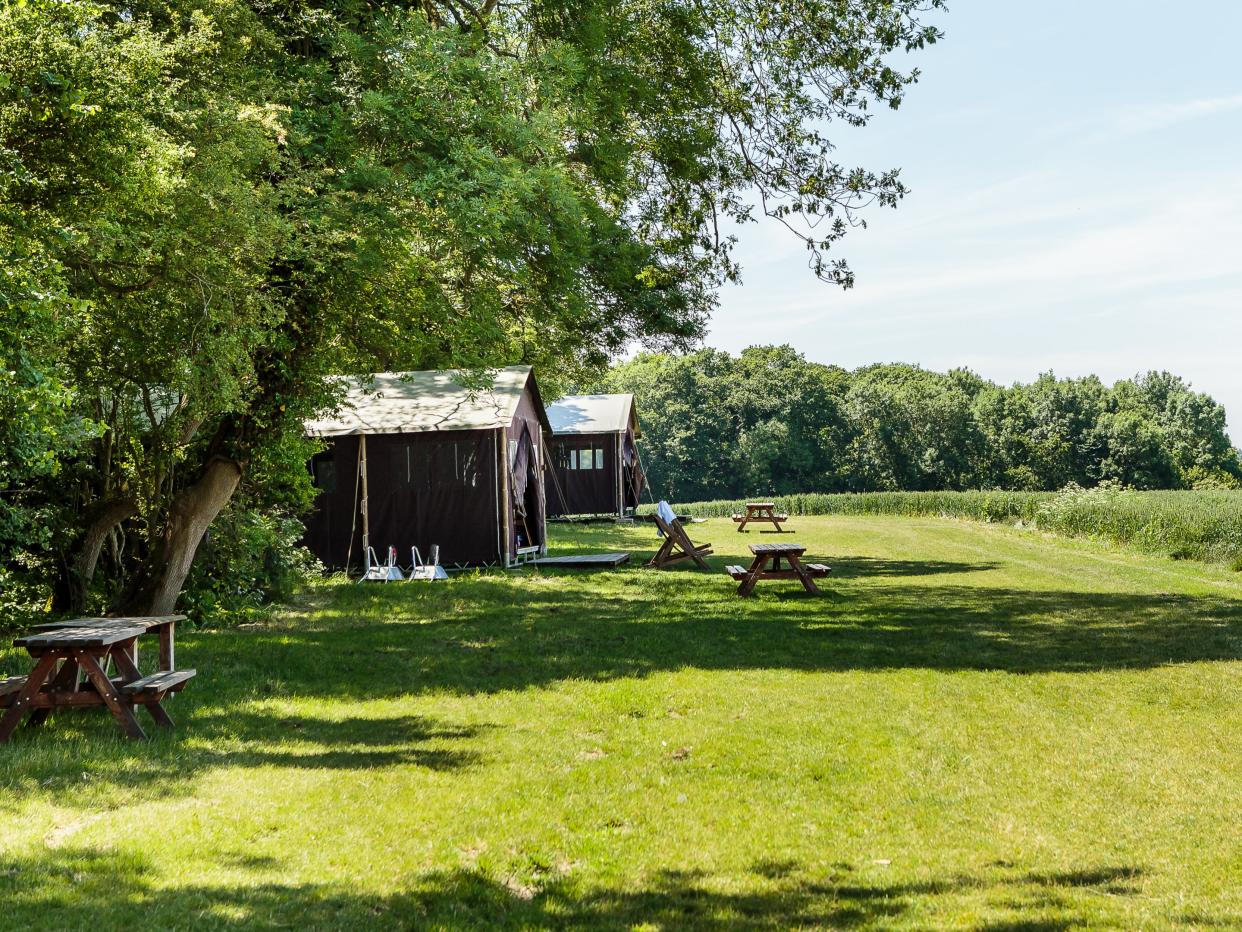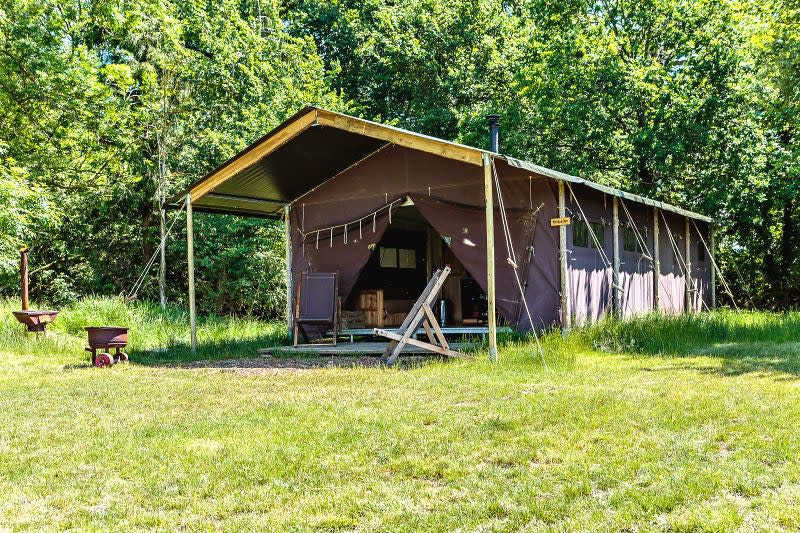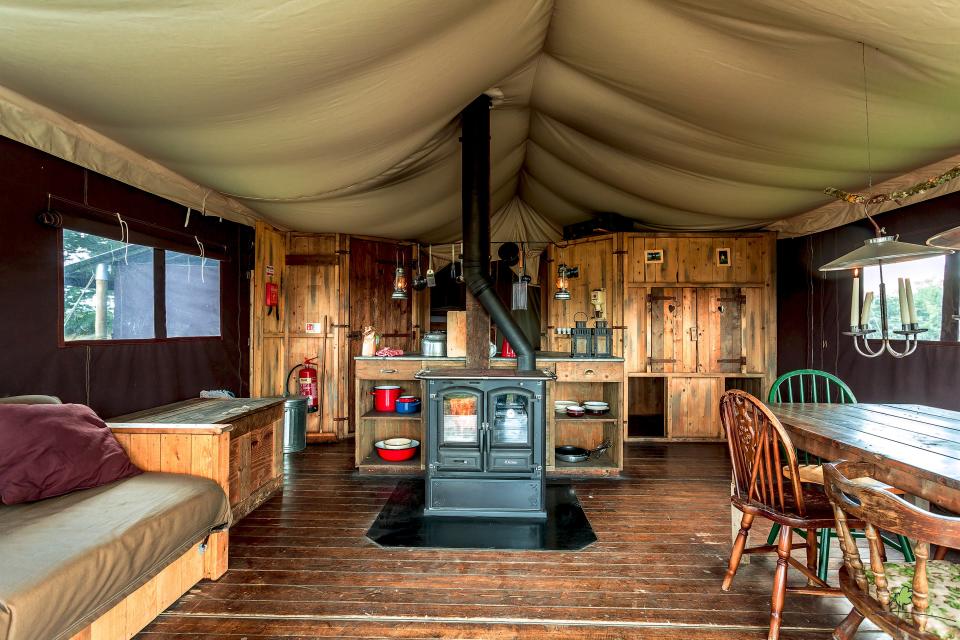Is a digital detox on a farm the answer to too much screen time?

Feather Down takes glamping to another level
(Feather Down Farm)Before I arrived at Moor Farm in the Cotswolds, I found myself hurriedly trying to use the train wifi to download a few episodes of a guilty pleasure Netflix show. It occurred to me, mere minutes before we pulled into the station, that this was the last chance saloon – my one and only opportunity to get some back-up entertainment sorted before leaving civilisation for a whole two nights.
As it turned out, I needn’t have bothered – Great Western’s internet was hardly built for such weighty tasks. I fought the rising panic in my chest as I reluctantly departed the carriage and greeted my taxi driver with a wan smile. “Moor Farm, eh? Nice and quiet round there,” he commented. “It’s practically the middle of nowhere.” This did nothing to soothe my troubled mind.
I never used to be this way; never used to be the type of person who can’t leave the house without their laptop, or spends every spare minute caressing their phone screen as if tenderly stroking an infant’s cheek. But something changed during our year of on-again, off-again lockdowns, and I found myself becoming more and more dependent on screens every waking moment (along with most of the country).

It was hard to avoid with the new routine: wake up, urgently check death toll on phone, more news via social media, breakfast, shower, dress, sit in front of laptop working for eight hours, move to a different chair while scrolling on phone, line up film to watch on TV, eat, sleep, repeat ad infinitum.
But not today. No, today I was heading to a glamping site with zero electricity and zero wifi. There would be no streaming, scrolling, or screen time of any kind. It wasn’t the sort of draconian set-up where they force you to put your phone in a locked box to ensure the digital detox isn’t compromised – more just that, as a side effect of having no power outlets, guests have little choice but to go offline for most of their stay. I compromised by switching my mobile to aeroplane mode to preserve its battery for “emergencies” – such as looking up where the nearest pub was.
I was met on arrival by the perennially friendly owner of Moor Farm, Richard, who, along with his tireless wife Wendy, was just about the most wonderful host you could wish for. “It’s just you staying for the next few days – hope that’s not too weird,” he told me in his broad West Country accent, before giving me a tour of the honesty shop – packed with local produce, snacks, alcohol, you name it – introducing me to Albie, the farm’s divine honey-coloured cocker spaniel, and driving me up to the tent that would be home for the next couple of days.
Free from digital stimuli, I slept so well I wasn’t even awoken by the crack of dawn birdsong
The whole operation is part of the Featherdown franchise, which offers glamping stays at a network of more than 50 working farms across the UK and Europe. The idea is to give guests an experience rooted in simplicity and authenticity, without sacrificing comfort or luxury. Well, that’s the theory, anyway.
I approached the whole thing with trepidation – to me, glamping has always been camping by a stupider name. But lo! When we reached the tent, it really did reek of comfort. On a wooden veranda out front, two deck chairs bookended the opening, set up as the ideal spot for sunset-watching. Inside, the dark wooden floors continued. And, set atop them, a proper dining table with chairs, a sofa, and a full-on kitchen, complete with wood-burning stove, extensive assortment of kitchenware, and even a sink with running water. Next, the rooms – yes, there were separate bedrooms – one set up for kids (or kidults) with bunk beds, another with a double bed, and a third bed found hidden inside a cupboard: all with proper mattresses, duvets and pillows. Last, the piece de resistance: an indoor toilet, sink and blessedly hot shower. This did not qualify as camping. This was something else entirely.

After building up a fire for me till the tent was crackling and warm, Richard bid me farewell, although not before promising to return the next morning with a tantalising-sounding breakfast basket. Light came in the form of candles and gaslamps, casting a cosy glow wherever I chose to hang them, and soon I was humming with contentment while I heated up the previous night’s leftovers on the stove and, screen-free, dove into the pages of my book instead.
That night, free from digital stimuli, I slept so well I wasn’t even awoken by the crack of dawn birdsong. I slept through until 9am, rousing only when the sunlight streamed through the tent’s “windows”. Outside was the promised basket, stuffed with fresh bread and croissants, butter, jam, orange juice, bacon, even coffee beans for the in-tent grinder. To my deepest shame, I never got to try it – I tried and failed to get a fire going in the stove three times before admitting defeat, settling instead for a continental breakfast.

After a day spent walking through blissfully empty fields and along the River Frome to reach the Ship Inn’s pub garden, from where I could more fully appreciate post-lockdown freedom over a pint of cider, I accepted Richard’s invitation to do a farm tour. Between feeding the gambolling goats and long-lashed cows, he shared his passion for sustainable farming. We stomped over to behold his pride and joy: his fields packed with clover, vetch and other nitrogen fixing plants, which enrich his soil without the need for fertilisers. We were soon talking carbon sequestration and the ineffectiveness of modern methods of farming that produce more and more of poorer and poorer quality with slimmer and slimmer profit margins – a conversation that was infinitely enhanced by Richard’s suggestion that we crack open a bottle of his son’s experimental “pear-secco”, a sparkling alcoholic drink made with – you guessed it – pears.
Back at the tent – having shamefacedly asked Richard to get the fire going again – I suddenly realised halfway through dinner that I did, in fact, have one episode of The Bold Type (don’t judge me) saved on my phone, and probably just enough battery to watch it. I picked it up. I put it down again. It just didn’t seem… right, somehow. A bright screen didn’t fit with the cosy candlelit setting; blaring American accents wouldn’t gel with the surrounding soundtrack of bird calls, lamb bleats and branch snaps as squirrels leapt from tree to tree. For the first time in a long time, I didn’t want to use a screen to mindlessly escape my surroundings for somewhere else – New York, Paris, outer space. I wanted to mindfully be exactly where I was: deep in the Gloucestershire countryside, reading by firelight, and sipping one last pear-secco for the road.
Cured of my digital dependence? It’ll take more than two nights off-grid. But my detox did remind me of the joy that exists beyond the confines of the rectangle that’s usually surgically attached to my hand. So what are you waiting for? Stop reading, put down the phone – and go and find a goat to play with.
Travel essentials
A four-night stay in a canvas lodge log cabin, sleeping a maximum of six guests (five adults), with a private en suite shower and flushing toilet at Feather Down Moor Farm costs £485 for selected dates in May and June. Visit featherdown.co.uk.
Read More
UK weather: The latest Met Office forecast
Welcome to my home town: Eastbourne doesn’t deserve its ‘God’s waiting room’ rep

